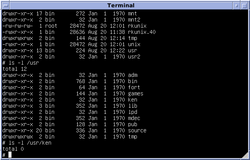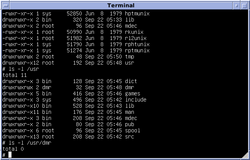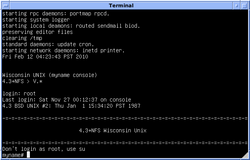Software:SIMH
This article needs additional citations for verification. (May 2019) (Learn how and when to remove this template message) |
| Developer(s) | Robert M. Supnik |
|---|---|
| Initial release | 1993[1] |
| Written in | C |
| Operating system | Windows, Linux, macOS, FreeBSD, OpenBSD, NetBSD, OpenVMS |
| Platform | x86, IA-64, PowerPC, SPARC, ARM |
| Type | Hardware virtualization |
| License | BSD-style licenses |
| Website | {{{1}}} |
SIMH is a free and open source, multi-platform multi-system emulator. It is maintained by Bob Supnik, a former DEC engineer and DEC vice president, and has been in development in one form or another since the 1960s.
Disambiguation
SIMH is also a Portuguese application for ICD-10-CM/PCS coding and DRG grouping
History
SIMH was based on a much older systems emulator called MIMIC, which was written in the late 1960s at Applied Data Research.[1] SIMH was started in 1993 with the purpose of preserving minicomputer hardware and software that was fading into obscurity.[1]
In May 2022, the MIT License of SIMH version 4 on GitHub was unilaterally modified by a contributor to make it no longer free software, by adding a clause that revokes the right to use any subsequent revisions of the software containing their contributions if modifications that "influence the behaviour of the disk access activities" are made.[2] As of 27 May 2022, Supnik no longer endorses version 4 on his official website for SIMH due to these changes, only recognizing the "classic" version 3.x releases.[3]
On 3 June 2022, the last revision of SIMH not subject to this clause (licensed under BSD licenses and the MIT License) was forked by the group Open SIMH, with a new governance model and steering group that includes Supnik and others. The Open SIMH group cited that a "situation" had arisen in the project that compromised its principles.[4]
Emulated hardware



SIMH emulates hardware from the following companies.
Advanced Computer Design
- PDQ-3
AT&T
BESM
Burroughs
Control Data Corporation
Data General
Digital Equipment Corporation
GRI Corporation
- GRI-909
Hewlett-Packard
Honeywell
- H316
- H516
Hobbyist projects
IBM
- 650
- 701
- 704
- 1401
- 1620
- 1130
- 7010
- 7070
- 7080
- 7090/7094
- System/3
Intel
- Intel systems 8010 and 8020
Interdata
- 16-bit series
- 32-bit series
Lincoln Labs – MIT Research Lab
Manchester University
- Baby, or SSEM
MITS
- Altair 8800 both Intel 8080 and Zilog Z80 versions
Royal-Mcbee
- LGP-30
- LGP-21
Sage Computer Technology
- Sage II
Scientific Data Systems
SWTPC
Systems Engineering Laboratories
- SEL-32 both Concept-32 and PowerNode systems
Xerox Data Systems
References
- ↑ 1.0 1.1 1.2 "Preserving Computing's Past: Restoration and Simulation" Max Burnet and Bob Supnik, Digital Technical Journal, Volume 8, Number 3, 1996.
- ↑ "simh repo: Add top level COPYRIGHT and LICENSE files · simh/simh@ce2adce" (in en). https://github.com/simh/simh/commit/ce2adce632e1a22e6d76d4bf726d6b863373c550.
- ↑ "SimH "Classic"". http://simh.trailing-edge.com/. "The V4 GitHub repository has been placed under a modified license that effectively makes it closed source. It will no longer be referenced here."
- ↑ "simh@groups.io | Announcing the Open SIMH project". 2022-06-03. https://groups.io/g/simh/topic/91528716#1659.
- ↑ "Altair Other Operating Systems". http://www.schorn.ch/altair_5.php.
External links
- Open SIMH
- Additional VAX/MicroVAX models for SIMH
- Running VAX/VMS Under Linux Using SIMH
- Debian Package
- FreeBSD Port
- UNIX: Old School. Using SIMH to explore UNIX history - Matthew Hoskins
 |

